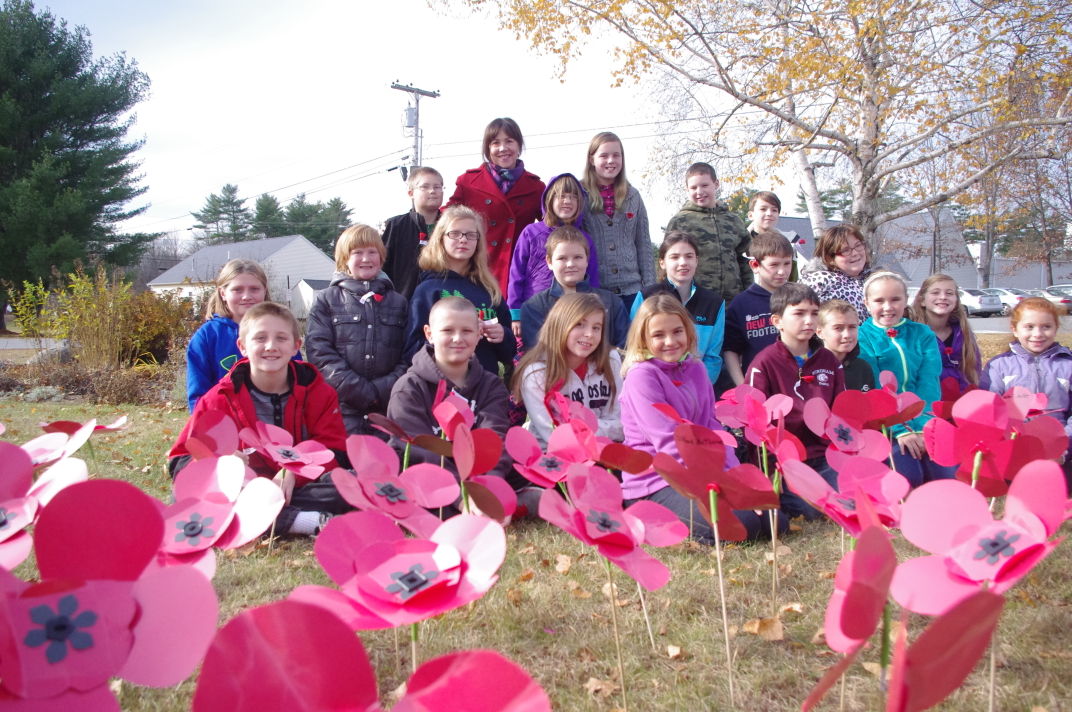WINDHAM – Sabrina Nickerson, a fifth-grade teacher at the Manchester School in Windham, knew she wanted to commemorate the 100th anniversary of the start of World War I with her students. The problem was that the “war to end all wars” is not part of her history curriculum.
Poetry, however, is. So, Nickerson had her class study “In Flanders Field,” the famous 1915 poem written by Canadian physician Lieutenant Colonel John McCrae in World War I.
“It is about a soldier saying, ‘Look, we’re here, we’re the dead, we’re heading out,’ ” Nickerson said. “We want you to carry the torch on for freedom, because if you don’t, then we’ve died in vain.”
“We don’t study World War I, World War II, anything post-Civil War in fifth-grade for history, but we are studying in literacy, poetry,” Nickerson added. “I love poetry, I love history – so I’m mixing the two.”
On Monday, Nickerson’s 22 students stood in front of the Manchester School, and read “In Flanders Field” together. Before them stood 96 freshly planted laminated red “remembrance poppies” – one for each of the Windham residents who served in the war.
Since 1921, poppies have been used to commemorate fallen soldiers across the world. The practice was pioneered by the American Legion in the wake of World War I.
With American Legion Field-Allen Post 148 Commander Mel Greenier watching, Nickerson’s students planted the 96 poppies in front of the Manchester School Monday. Before planting each poppy, each student read the name of the World War I veteran that it was dedicated for.
To Greenier, whose grandfather, Homer John Greenier of Caribou, served in the war, the ceremony was an occasion to reflect on the sheer magnitude of that war.
“Windham probably had about 1,000 people back then, and we had 96 Windham veterans that served in World War I,” Greenier said. “When you think about it, that’s almost 10 percent.”
Nickerson said she emphasized the horror of the war, when discussing it with her students.
“One of the things that I found out and talked to the students about was between the lice, the rats and the constant headaches it’s amazing they didn’t just all give up, because it was a terrible, cold, muddy, really miserable existence,” Nickerson said. “It just was horrible – really horrendous.”
The Windham veterans consisted of 95 soldiers and one nurse, Nickerson said.
“Two of them died on the battlefield, and the rest of them came back,” she said. “But they came back with various degrees of troubles, like the mustard gas they used. The fact that they had wounds, they lost arms or legs, and of course there’s the post-traumatic stress that we know of now that was just as bad.”
The class’s “Foster Grammy,” Polly Dyer, helped the students construct the poppies, which were made of red recycled paper, buttons, dowels and pipe cleaners.
Nickerson said she hopes to commemorate the upcoming anniversaries of the war, as well.
“This would be great to do every year, and the next four years we have an anniversary,” she said.
 Sabrina Nickerson’s students planted the 96 poppies in front of the Manchester School Monday. Before planting each poppy, each student read the name of the World War I veteran that it was dedicated for.
Sabrina Nickerson’s students planted the 96 poppies in front of the Manchester School Monday. Before planting each poppy, each student read the name of the World War I veteran that it was dedicated for.
Comments are no longer available on this story